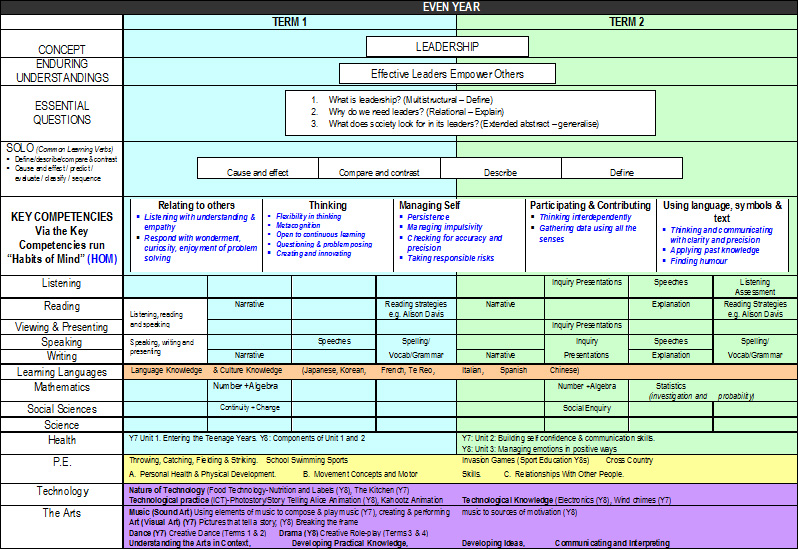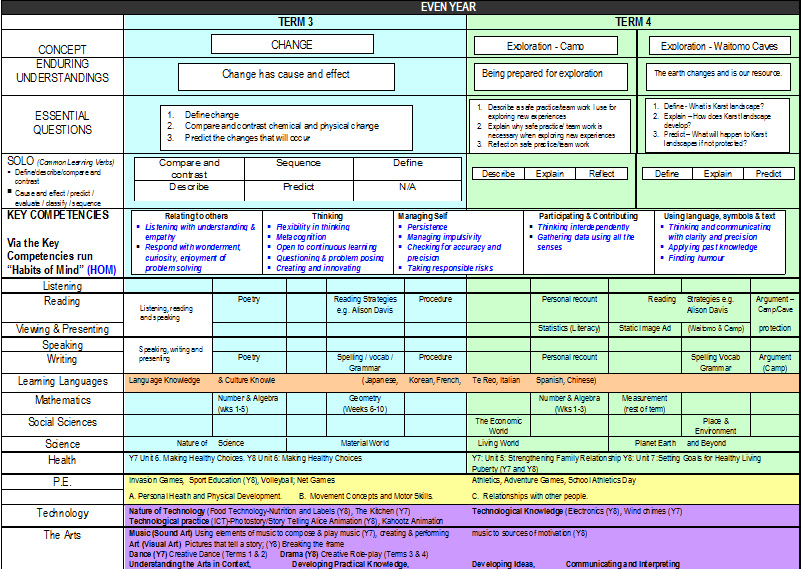Concept Curriculum
Contents |
Concept Curriculum
What is a Concept?
timeless, abstract, broad
shown through a variety of examples
supports integrated curriculum approaches
develops generalisation (insight/ enduring understanding)
Macroconcepts:
Form Function Systems Structure Change Communities Order Constancy Symbolism Relationships Measurement Patterns Complexity Cycles Movement Perspective
PYP Concepts: Form (What is it like?), Function (How does it work?), Causation (Why is it like it is is?), Change (How is it changing?), Connection (How is it connected to other things?), Perspective (What are the points of view?), Responsibility (What is our responsibility?), Reflection (How do we know?)//
Universals:
“Universals” – what all cultures have in common - Language, Communication, Fantasies, Stories, Tools and art, , Superstition, Religion and magic, Play and games, Differences over similarities (?), Quick reactions to patterns, Vendetta
Te Ao Maori:
Turangawaewae - a place to stand
Whanaungatanga - relationships and connectedness
Manaakitanga - generosity of spirit and respect
Whakatauki - stories, proverbs and communication
Tino Rangitiratanga - self - management and determination
Kaitiakitanga - guardianship
Taonga - a treasured thing
Ako - to learn,to study to teach
Microconcepts:
The following has proven popular with New Zealand Schools planning units for a concept curriculum. Please suggest any other microconcepts that have worked for your students and we will add them to this resource.
| Abundance Scarcity Acceptance Rejection Achievement Action and reaction Adaptation Aging Maturity Ako Angle Authority Balance Behaviour Beliefs and values Cause and effect Change and Continuity Character Citizenship Communication Conflict Conflict and cooperation Connectedness Connections Conservation Consumption Control Cooperation and competition Correlation Courage Creativity Culture Customs and practices Cycles Decision making Defense Protection Democracy Development Direction Discovery Distribution Diversity Ecological sustainability Energy Enterprise Environment Equilibrium Equity and access |
Evolution Exploration Fairness Feelings Freedom from and freedom to Friendship Future Gender Globalisation Growth Harmony Honour Human rights Identity Imagination Indigenous people Individuals and groups Innocence Institutions Interactions Interdependence Invention Isolation Justice Kaitiakitanga Language Leisure and labour Liberty Lifestyles Line Living and non living Loyalty Mana Metaphor Migration Mood Needs and wants Niche Organisation Paradox Perception Physical world Place and space Politics Position |
Power Production Proof Reliability Religion Renewable Repetition Resources Revolution Rhythm Right of passage Rights and responsibilities Ritual Rules and laws Safety Similarity and Difference Social organisation Society Space Success Supply and demand Survival Taonga Technology Time Timing Tino rangatiratanga Tradition Transformation Transition Turangawaewae Tyranny Uncertainty Validity Variance Wealth Well being Whakatauki |
School Examples HOT Concept Curriculum Wall Planner
Blockhouse Bay Intermediate School
Mamaku School Rotorua
File:Mamaku HOT Concept Curriculum Wall.pdf
| HOT Concept Curriculum Wall |
Year One |
Year Two | ||||||
| Term One |
Term Two |
Term Three |
Term Four |
Term One |
Term Two |
Term Three |
Term Four | |
| Weeks |
Weeks |
Weeks |
Weeks |
Weeks |
Weeks |
Weeks |
Weeks | |
| Macro-Concept |
Turangawaewae - a place to stand |
Kaitiakitanga – guardianship |
Tino Rangitiratanga - self-management, determination |
Whanaungatanga –relationships, connectedness. |
Whakatauki -stories, proverbs and communication |
Change |
Perspective |
Manaakitanga - generosity of spirit and respect Alternatives: Taonga - a treasured thing Ako - to learn,to study to teach |
| Micro-concept |
Home, belonging, security, connected |
Sustainability - Environmental Social, Economic |
Citizenship, Rights, responsibilities, values, justice, initiative, free choice, freedom to determine own political status, freedom from and freedom to |
Systems, relationships networks, homeostasis interdependence, globalisation. |
Narrative, fable, myth, legends, metaphor, |
Adaption, growth cycles, sequences, transformation |
Subjectivity, truth, beliefs, opinions, prejudice, |
Giving, empathy, altruism, philanthropy, selflessness |
| Enduring Understanding |
We are attached to place (security) but yearn for space (freedom). |
Our choices have consequences, People make choices based on their understandings, and the actions they take as a result do make a difference |
We are not passive observers of events, we can make and must make choices, and that by doing things so we can make a difference. |
We live in a world of interacting systems in which the actions of any individual element affect others. |
We tell stories to understand ourselves. Thoughts, opinions, and information about our world is exchanged by speech, writing, non verbal signs or images. |
Change is the process of movement from one state to another. It is universal and inevitable. |
What we know is moderated by perspectives; different perspectives lead to different interpretations, understandings and findings; perspectives may be individual, group, cultural or disciplinary. |
Helping others without coercion or expectation |
| The Driving Question |
How am I connected to this place? |
What will I leave behind? |
What choices can we make? |
How is it connected to other things? |
What is the story? |
What is changing? |
What are the points of view? |
How can we help? |
| Three SOLO coded Questions for Performance for Understanding [at multistructural, relational, extended abstract learning outcomes] |
Question 1:. Describe a place/ turangawaewae Question 2:. Explain how a space became a place. Question 3:Reflect on the importance of your “Turangawaewae” |
Question 1: Define kaitiakitanga or sustainability Question 2: Explain the cause and effect of a sustainable action. Question 3: Predict what might happen in the future if we do not make wise choices. |
Question 1: Define freedom Question 2: Compare and contrast freedom from with freedom to Question 3: Evaluate which you would rather have, freedom from or freedom to. |
Question 1: Describe a connection Question 2: Explain the causes and consequences of a connection Question 3: Generalise about connections |
Question 1: Retell a story Question 2: Compare and contrast stories Question 3: Generalise about the message communicated |
Question 1: Describe a change Question 2: Explain cause consequence of a change Question 3: Evaluate the effects of a change |
Question 1: Describe a point of view Question 2: Explain the cause and consequence of a point of view Question 3: Reflect on the influences on your point of view |
Question 1: Define respect Question 2: Explain the consequences of respect Question 3: Reflect on times when you have been shown and shown respect. |
| Learning Intentions: Concept [HOT SOLO Learning verbs: Define, Describe, Sequence, Classify, Explain, Analyse, Analogy, Generalise, Evaluate, Reflect, Predict] |
For example; Learning verb, HOT map and self-assessment focus for term |
|
|
|
|
|
|
|
| Learning Interventions ICTs Thinking skills and strategies |
For example; ICT skills and strategies for term Thinking skills and strategies for term |
|
|
|
|
|
|
|
| The New Zealand Curriculum |
|
|
|
|
|
|
|
|
| Key Competencies Thinking Managing self Participating and contributing Relating to others Making meaning from Language Symbols and text |
For example; Identify a dimension from each KC to focus on for term |
|
|
|
|
|
|
|
| Values: Excellence, by aiming high and persevering in the face of difficulties, Innovation, inquiry, and curiosity by thinking critically, creatively and reflectively. Diversity as found in our different cultures, languages and heritages. Community and participation for the common good |
For example; Identify a value to reflect upon for term |
|
|
|
|
|
|
|
| NZC Learning Areas, Essence Statements and Achievement Objectives |
|
|
|
|
|
|
|
|
| The Arts In the arts, students explore, refine, and communicate ideas as they connect thinking, imagination, senses, and feelings to create works and respond to the works of others. Dance Drama Sound Arts Visual Arts [UAC, DPK, DI, CI] |
For example; Sculpture |
For example; Painting |
For example; Printmaking |
For example; Dance |
For example; Drama |
For example; Performance |
For example; Music Creating |
For example; Music Appreciation |
| English In English, students study, use, and enjoy language and literature communicated orally, visually, or in writing. |
For example; Listening, Reading, Viewing:Comprehension Researching Gathering Information Speaking, Writing, Presenting: Narrative |
For example; Listening, Reading, Viewing: Comprehension Researching Gathering Information Speaking, Writing, Presenting: Reports |
For example; Listening, Reading, Viewing:Comprehension Researching Gathering Information Speaking, Writing, Presenting:Instructions |
For example; Listening, Reading, Viewing:Comprehension Researching Gathering Information Speaking, Writing, Presenting: Letters |
For example; Listening, Reading, Viewing: Comprehension Researching Gathering Information Speaking, Writing, Presenting: Layouts |
For example; Listening, Reading, Viewing:Comprehension Researching Gathering Information Speaking, Writing, Presenting:Explanations |
For example; Listening, Reading, Viewing:Comprehension Researching Gathering Information Speaking, Writing, Presenting: Poetry |
For example; Listening, Reading, Viewing:Comprehension Researching Gathering Information Speaking, Writing, Presenting:Speeches |
| Health and Physical Education In health and physical education, students learn about their own well-being, and that of others and society, in health-related and movement contexts. [PH and PD, MC and MS, ROP, HC and E] |
For example; Personal Health and Physical Development |
For example; Healthy Communities and environments |
For example; Healthy Communities and environments |
For example; Relationships with other people |
For example; Personal Health and Physical Development |
For example; Movement Concepts and Motor Skills |
For example; Relationships with other people |
For example; Healthy Communities and environments |
| Learning Languages |
For example; Cultural Knowledge |
For example; Language Knowledge |
For example; Communication |
For example; Cultural Knowledge |
For example; Communication |
For example; Language Knowledge |
For example; Cultural Knowledge |
For example; Communication |
| Mathematics and Statistics In mathematics and statistics, students explore relationships in quantities, space, and data and learn to express these relationships in ways that help them to make sense of the world around them. [N and A, G and M, S] |
For example; Number and Algebra: Number strategies and knowledge Equations and expressions Patterns and relationships Geometry and Measurement:Measurement Shape Position and orientation Transformation Statistics: Statistical Investigation Statistical Literacy Probability |
For example; |
For example; |
For example; |
For example; |
For example; |
For example; |
For example; |
| Sciences In science, students explore how both the natural physical world and science itself work so that they can participate as critical, informed, and responsible citizens in a society in which science plays a significant role. [NOS, LW, PEB, PW, MW] |
For example; Planet Earth and Beyond |
For example; Living World |
|
For example; Physical World |
|
For example; Material World |
For example; Nature of Science |
For example; Living World |
| Social Sciences In the social sciences, students explore how societies work and how they themselves can participate and take action as critical, informed, and responsible citizens. [ICO, PE, CC, EW] |
For example; Identity Culture and Organisation |
For example; Place and Environment |
For example; The Economic World |
For example; Identity Culture and Organisation |
For example; Identity Culture and Organisation |
For example; Continuity and Change |
For example; The Economic World |
For example; Identity Culture and Organisation |
| Technology In technology, students learn to be innovative developers of products and systems and discerning consumers who will make a difference in the world. [TP, TK, NT] |
For example; Technological Practice Technological Knowledge Nature of Technology |
|
|
|
|
|
|
|
| School Events e.g. school camp, production, athletics sports, library week, ANZAC Day, Waitangi Day, Matariki |
Waitangi Day Easter |
ANZAC Day Matariki Queen’s Birthday |
|
Labour Day |
Waitangi Day Easter |
ANZAC Day Matariki Queen’s Birthday |
|
Labour Day |
| ||||||||||||||||||||||||||||||||||||
Copyright © Hooked on Thinking. Pam Hook and Julie Mills, 2004 to 2011. All rights reserved.
Unless clearly stated otherwise, copyright material contained on this site is the intellectual property of Hooked on Thinking, Pam Hook and Julie Mills.
You may not use this work for commercial purposes. You may not alter, transform, or build upon this work without the written permission of the rights owner.




